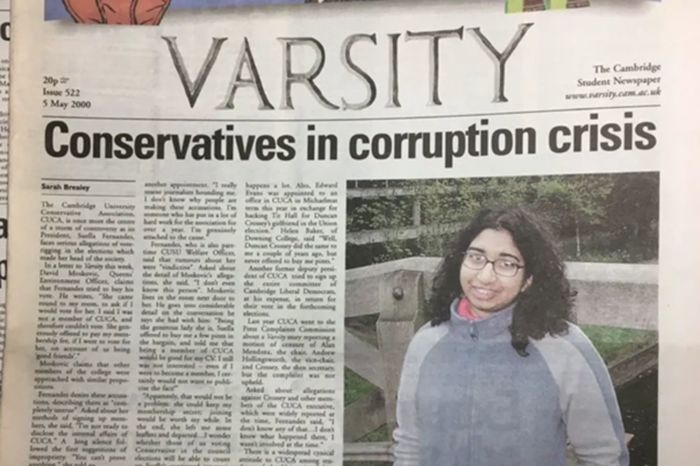Vintage Varsity: Click here to graduate
Vintage Varsity explores our changing perceptions of the ‘virtual degree’

Back in the year 2000, a Varsity article discussing the pros and cons of us “studying online rather than in residential universities” was accompanied by an illustration with a haunting caption: “Click here to graduate”. Given the events of 2020, this eye-catching image now appears as less of an exaggerated sign of things to come and more of an uncanny prediction. Although the shift to internet learning eventually came from a global pandemic and not from the “era of globalisation,” it is interesting to consider how, despite predictions of a great technological explosion 20 years ago, the mechanisms for Zoom and Teams calls were not properly established until we were quite literally forced out of residential universities and into our own homes. Although the article expected an imminent reliance on online tools, this does not seem to have happened in the way they expected.
The article’s ending is hopeful that “it will be a long time” before the residential university becomes obsolete. Today, we seem to share the same sentiment. Online learning is an option for students, but not a necessity. This is great for improving accessibility, and many of us have made great use of the internet throughout our degrees. We do make great use of online technology; it’s rare to see hand-written lecture notes when Google Docs and Notion exist. We research essays online. We write essays online. We submit essays online. Still, it is important to note that these developments haven’t made in-person learning or its accompanying facilities obsolete. We seem very attached to our residential universities, and many students still quiver in fear at the prospect of another virtual freshers week - or even the dreaded message that the book you needed from the faculty library is currently on loan.
“These developments haven’t made in-person learning or its accompanying facilities obsolete”
In October 2020, Varsity released an article praising the many creative schemes organised by JCRs to host a fun freshers week despite the pandemic. Despite almost everything else happening virtually, including meet-ups with friends, Freps (Freshers’ reps) were determined to host something in person. Some colleges opted for socially distanced beer gardens, while others went punting in groups of six.
Although we may have the resources to move online, students are reluctant to do so. After all, it can sometimes be difficult to pay attention in supervisions when you’re there in person; add in the comfort of your bed, and forget about learning a single thing. The 2000s seemed to anticipate this risk since the article argues against online universities by citing the Open University’s use of in-person seminars. Ultimately, in-person learning gives you a reason to get out of bed. Varsity’s early-2000s optimism praised online degrees as giving “a greater degree of control,” but what students really need is a sense of stability.
Besides, half the fun of university comes from the social aspect. Even if you’re only socialising in lectures or briefly in your college bar, it’s much better for your mental health to be around other people than to stay cooped up in your room, crouched over a computer and staring into a camera lens all afternoon. The early 2000s did seem apprehensive of the daunting prospect of graduating with a click of a button. If our predecessors had predicted our habit of logging into Teams and going immediately back to sleep, I don’t believe they would have even considered the end of residential universities - in the near or distant future.
 Comment / Cambridge’s tourism risks commodifying students18 April 2025
Comment / Cambridge’s tourism risks commodifying students18 April 2025 News / Cambridge student numbers fall amid nationwide decline14 April 2025
News / Cambridge student numbers fall amid nationwide decline14 April 2025 News / Greenwich House occupiers miss deadline to respond to University legal action15 April 2025
News / Greenwich House occupiers miss deadline to respond to University legal action15 April 2025 Comment / The Cambridge workload prioritises quantity over quality 16 April 2025
Comment / The Cambridge workload prioritises quantity over quality 16 April 2025 News / Varsity ChatGPT survey17 April 2025
News / Varsity ChatGPT survey17 April 2025





